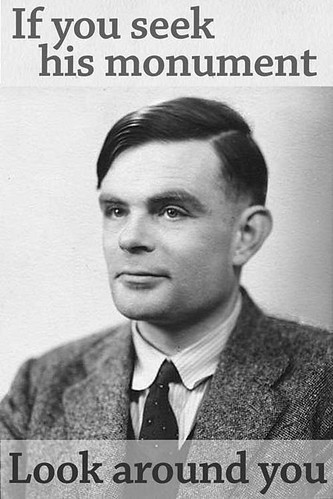Alan Turing was certainly one man ahead of his time. He was fascinated by mathematics and logic and laid the foundations for what would become modern computer science. He helped the United Kingdom in the war efforts to break the Enigma, a dreaded cryptography machine used by Nazi Germany for communications. Later, he would also come up with concepts that just now are being explored such as artificial intelligence and mathematical biology (BBC Horizon).
Turing was homosexual, for this sole reason, he was arrested in 1952 for indecency. He was chemically castrated and had developed a depression that might have caused his suicide (Doan, 2017). Doan (2017) reflects on his tragic fate as a classic example of how society’s prejudice robbed him of a dignified and fulfilling life.
We might have progressed in tolerance and respect of LGBTQ+ community in most countries; however, LGBTQ+ scientists are still more likely to suffer discrimination in the workplace. This culminates in a higher likelihood of depression, stress at work, insomnia, and other health issues (ELSE, 2021). Specially LGBTQ+ ethnical minorities and women are subject to the effects of prejudice (ELSE, 2021).
Let us not forget this tragic example and keep fighting to promote a more egalitarian culture in honor of Turing’s and so many lives wasted to intolerance. As scientists, we can advocate for more inclusive and respectful workplaces and societies for everyone, regardless of gender expression and sexual orientation.

This article was written by André Plath as part of a series on LGBTQIA+ History Month. curated by BioTrib’s Early Stage Researchers.
André is one of BioTrib’s Early Stage Researcher‘s who is investigating Boundary Lubrication of Fibrous Scaffolds at ETH Zürich, Switzerland.
Header Image: “Alan Turing” by avaragado is licensed under Creative Commons. Image source: https://wordpress.org/openverse/image/a6514d5d-a295-4a60-8023-9a3e89f81c1b
References
Alan Turing BBC Horizon. Available at: <https://www.youtube.com/watch?v=Z-sTs2o0VuY>
Doan, L. (2017). Queer History / Queer Memory. In GLQ: A Journal of Lesbian and Gay Studies (Vol. 23, Issue 1, pp. 113–136). Duke University Press. https://doi.org/10.1215/10642684-3672321
Else, H. (2021). The largest-ever survey exposes career obstacles for LGBTQ scientists. In Nature. Springer Science and Business Media LLC. https://doi.org/10.1038/d41586-021-00221-w

